Lisa Niver's Blog: We Said Go Travel, page 366
September 9, 2014
Changing to a Citizen of the World
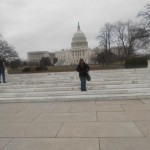
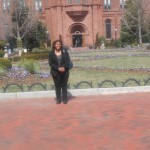
“It was quite an adventure, one of the best in my life. Getting lost in those crumbling catacombs beneath Rome”, “We were always just famished, that was until we discovered the amazing bread stores, that’s when our waistlines were compromised”, ” my mother’s stories of her travels around Europe had me spellbound. I grew up with my mother speaking to us in the Spanish she perfected while abroad in Spain. I always told myself that one day I would have an experience that would forever change my perspective of the world. It was my mother’s stories perhaps that got me interested in traveling however, my obsession with language and culture has always been a part of me. It was never uncommon to see me attempting to have a full on conversation with myself in Japanese or Chinese
When I got my first job at age 15 at Panda Express I worked hard to save up for my first car. By age 16 I was driving around looking for the next big thing to save for. I had my heart set on traveling to the Smithsonian Museum in Washington D.C., It had been a dream of mine since I was young. This is where I got my first taste of freedom and independence. I saved up my money and flew out, it was one of the most amazing experiences so far in my life. I had never encountered such a variety of cultures in one area. Washington D.C was bustling with life and I was swept up in the experience.
While I sat in a Zen state of mind in the National Botanical Gardens, a young man approached me and asked me to take a picture of him and his family, I gladly obliged. Afterword he and I began to speak and I learned that he was visiting from China so I began to speak to him in his native tongue of Mandarin. It was in that moment that I realized how truly free and independent I was. Here I was across the country, actually getting to use the language I learned in high school and soaking in the radiance of the botanical gardens. I will never forget that experience as it set ablaze within me the desire to travel even further and meet even more marvelous people.
I am leaving for Chiang Mai, Thailand on August 20 to study at Chiang Mai University. This will be my very first time out of the country! Although I am rather scared, I am determined to broaden my horizons and gain even more independence. I am an anthropology major and studying abroad will give me abundant insight into my major. Learning about different cultures while abroad, offers a wealth of knowledge that most textbooks do not convey. Using the language skills my mother acquired while abroad has always given her a competitive edge when out searching for a job. I too, hope to stand out amongst the rest when I am looking for my career, colored in the multicultural hues of the world. I know that having a world view will benefit me in any career as it will allow me to relate to and sympathize with peoples of many different backgrounds.
I truly believe that to become a citizen of the world, traveling is essential. Until one is capable of seeing the world through the lenses of varies cultures one is operating under a handicap. Blinded by their own ideologies, dreams, and prejudices. This is why traveling is so important for me. To travel is a great thing, to evolve as a human being is something even greater.
Thank you for reading and commenting. Please enter the Independence Travel Writing competition and tell your story.
The post Changing to a Citizen of the World appeared first on We Said Go Travel.
Tawi-Tawi, Philippines: A trek up a mountain
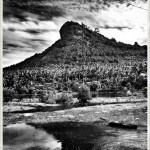
I was thirsty and hungry by the time my companions and I reached the peak of Bud Bongao in the Philippine province of Tawi-Tawi. The trek up this sacred mountain is supposed to be an easy, one-hour climb perfect for mountaineering newbies, but ours easily dragged to two long hours, largely because of my own klutziness.
Our guide, Lance, was visibly bewildered each time I appeared exhausted or uttered my willingness to just quit and head back where we came from. But each time, he would let go a silly grin before mouthing off words of encouragement. “See those folks right there,” he would begin, pointing at gray-haired men maneuvering the slippery trail with babies slung across their chests. “They make you look bad.”
I’ve climbed two mountains before — Mount Makiling in Laguna and Mount Samat in Bataan, both in the Philippines — but if anything, these experiences have proven nothing more than the fact that I’m not physically capable of enduring strenuous outdoor activities involving testosterone and incredible leg power. I’m simply not cut out for it.
My lowest point may have happened a year ago when, on a trip to Kuala Lumpur in Malaysia, a flight of 200 steps going up the holy Batu Caves drew out the fearful in me: pulling up my legs towards the 21st step, I suddenly grew cold and realized I didn’t have the strength to push any further. It didn’t help that I was nursing a mild case of vertigo, too.
As I turned back to descend, I was greeted by a couple of tourists aghast at the sight of someone surrendering so easily, their faces a reminder that disappointment and perhaps some semblance of embarrassment have a universality identifiable anywhere you go.
In Tawi-Tawi, I managed to reach Bud Bongao’s peak, but not without straining my companions’ patience and testing the limits of what I can endure. In certain respects, the climb has transcended its physical aspect and has evolved into an emotional and mental exercise where many times I’ve been found wanting. But in a holy mountain that serves as the burial site to a Muslim saint, truth can be ascertained while perched at the top, the wind and the elements conjuring up an entirely new world so near yet so distant.
From this vantage point, the worries of the world below are muted out by the strange silence enveloping the rocky peak, interrupted every now and then by the gentle rustle of golden grass and the squawks of hawks gliding overhead. This must have been the spiritual experience professional mountaineers so fondly talk about when asked what keeps them going; it’s a marvelous, albeit temporal, feeling of accomplishment that renders
negligible all muscle pain better than ibuprofen.
It dawned on me that climbing a mountain is as much a metaphorical exercise as it is physical. The slippery, at times perilous, trail leading up to the
peak provides the tension necessary to justify the otherwise magnificent feeling once at the top. It’s essentially a self-rewarding endeavor for people who are more than willing to tough it out in exchange for a moment of glory that is at once lasting and ephemeral.
Perched at the top, my companions and I took our own spots to savor it all in. Thirsty and hungry, I drank what remained of the water we had brought
and grabbed some bananas reserved for the mountain’s resident macaques. As I sat marveling at the panoramic view of the sea and the islands, I
couldn’t help but wonder whether the mystical tales attached to this holy mountain meant I was bound to see and experience a miracle myself.
Lance, who had earlier driven us around the city of Bongao in his colorful tricycle, relayed that this mountain used to be protected by a giant and
powerful white monkey that has since disappeared. A mountainside spring with miraculous water that can cure all sorts of illnesses was also said to draw legions of faithful. When we found it, though, there was no one else around it. In its place was a dry well
inhabited by thick moss and layers of decomposing foliage.
It would have been good had I become privy to any of the holy mountain’s miracles, but I didn’t. The most that I could hold on to was a wish I muttered as I tied a torn piece of scarlet ribbon onto the branch of a tree rising along a dangerous slope, mixing in well with countless other ribbons tied by climbers who, like me, got to this part of the mountain.
It was easily a case of weariness giving way to hopefulness, of aching muscles not mattering at all. This was, perhaps, the miracle I was looking for.
Thank you for reading and commenting. Please enter the Independence Travel Writing competition and tell your story.
The post Tawi-Tawi, Philippines: A trek up a mountain appeared first on We Said Go Travel.
September 8, 2014
France: A Place That Allows Me To Feel Free
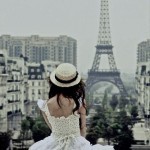
France: A Place That Allows Me To Feel Free
I’ve been living in NYC for the past 6 years of my life. I came with excitement and anticipation for what I felt life would hold for me here. Now I feel my time spent in NYC has been spent well. What I used to feel, the hustle and bustle, the fast-pace lifestyle has become something I loathe. I used to drink in the energy the city poured into me. The action packed lifestyle quenched my thirst. But now I have become tired and drained of it. I am weak on the insensitivity and aloofness. I long for the place I fell in love with years ago and swore to return to again. France. I went on a 3-week trip to France in 1994 when I was in high school with my French class. I was barely 17 years old and although it was more than 20 years ago, I still feel the experience to this day. We spent one week with a French family and two weeks travelling the French countryside. How freeing it was to observe how the French people lived their daily lives, the easiness and simplicity was refreshing. Of course being in high school back then I had yet to know what “real life” was like, but I remember the feelings of tranquility. The air was light and humorous.
Every moment in France was to be enjoyed, savored and cherished. Lunch hour was a midday break – purposefully long enough to stroll home and enjoy lunch with loved ones or take a nap. A long walk home easily included observing the gorgeous rainbow of wildflowers lining the sidewalks while inhaling their earthy scent.
Family time is cherished and life revered. It was typical to stop by the local bakery on the way home after work to grab a baguette for the evening’s dinner. And every night during my stay we ate dinner at the table as a family. I never once felt like an “American.” I had an interest in the French culture and their way of life. I was simply an observer, on the outside looking in. The feelings of being free and independent in a world so foreign to my own, was a resplendent experience.
As I observed the French people, I found their bodies to be lithe and agile, similar to ballerinas. Their clothing was light and free-flowing. My French “mom” donned a slight form-fitting dress accompanied with simple flats for a day of visiting the Chateau de Versailles Gardens. And we lounged on the grounds laughing as I practiced communicating in French. The Gardens were beautiful – perfectly manicured landscapes enclosing statues and luxurious water fountains. It was peaceful, even time slowed down to take a break. I likened it to a scene in Alice in Wonderland – a beautiful place full of mysterious adventure.
In the morning we would sit in street cafes feasting on croissants with preserves, des pains au chocolats, fruit and coffee or tea watching pedestrians walk by. By mid-afternoon we were on a boat heading down La Seine river. The day had grown cool and the sky was gray but the ride was amazing. How therapeutic it was to be miles and miles away from home in the most romantic city in the world, Paris!
Thank you for reading and commenting. Please enter the Independence Travel Writing competition and tell your story.
The post France: A Place That Allows Me To Feel Free appeared first on We Said Go Travel.
Kuala Lumpur, Malaysia Impulse
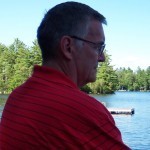
I had been visiting London on business when I decided to move from my hotel, the Thistle Marble Arch, in Central London to the Airport Hilton near Heathrow. To confirm my departure ticket I found the courtesy hotel computers in an alcove near the bar area on the main floor. One of two computers was broken beyond all repair. The other was being consulted by two harried, forty-something world travelers, a man and woman, with backpacks. The woman took me aside and told me not to interrupt her companion, Ken, because he had already broken one computer and he was evidently taking delight in breaking the other. As if he had heard her, Ken gave us a dark look just then before he ducked his head and began hammering on the computer keyboard again.
I looked around for assistance, but the night staff had discreetly disappeared. I knew that my only chance was to remain on station until the two travelers had either completed their apparently hopeless objective or surrendered their computer. Putting the best construction on the situation, the woman, whose name was Carrie, told me that the two of them, both South Africans, had come from Nairobi the day before yesterday, and here they were stuck near Heathrow when they should already be headed for Kuala Lumpur. She said that they had forward-booked all the way through, but now something had gone horribly wrong, and the booking concern was unreachable.
I sympathized, but I could do nothing to help except to listen to their tales of woe while I waited for my chance to use the computer. I asked why the pair had selected Kuala Lumpur as their destination. Carrie, in response, launched into her encomium listing every tourist sight from the Petronas Twin Towers to the Batu Caves, but when I pressed her for additional specifics, Carrie confessed that Ken and she had very little money between them. In fact, they had spent nearly everything they had saved on the bargain tickets for their airfares. She said that they were going to stay with student friends at the main campus of the University of Malaya. What they saw of Kuala Lumpur and Malaya would depend in part on the willingness of their friends to provide lodgings and meals while they were in the country. Ken came away from the computer he had commandeered to announce that he thought it had broken just as the first computer had done. He suggested that he and Carrie get something to eat. That having been done, he would try once again to get through to their travel booking agent. Perhaps then the agent will have returned.
Ken and Carrie picked up their backpacks and wandered towards the restaurant. When they had gone out of sight, I tried to see what I could do with the computer. As these things sometimes go, the computer allowed me access so that I could print my boarding pass as I had planned. I left the computer screen at the courtesy login page with the hope that Ken and Carrie would return and discover that they could accomplish their mission now that the machine had been fixed. In fact, though, their plight reminded me of classmates who had done their longhaired meandering tours of self discovery, including Kuala Lumpur, in the Sixties or Seventies of the last century. Ken and Carrie were not students, but they wanted to consort with students. They had the same affectations as my former friends with the additional ill grace of computer illiteracy. I left for the airport the next morning mentally wishing them well but realistically fearing for their safety. The wandering pair were miscast in the Twenty Teens, and their preferred métier had long passed beyond relevancy. The Kuala Lumpur that Carrie said they longed for had given way to international chic, and the gurus were now bankers and accountants for the super rich.
Thank you for reading and commenting. Please enter the Independence Travel Writing competition and tell your story.
The post Kuala Lumpur, Malaysia Impulse appeared first on We Said Go Travel.
September 7, 2014
The Yauri I will never forget in Nigeria
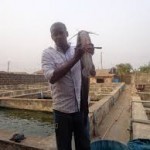
Do you know that a bird on hand is much better than many on tree? At times, giving eyewitness account only reduces a story to nothing but understatement or exaggeration. In the past, I’ve heard too many stories from my friends about their tour to various places where they could be themselves however it only poisons my blood to induce effect. Happily for me, I’d grabbed a bird. Here is it.
In 2013, I was mobilized to another part of my country by the Federal Government of Nigeria. Though, it was a 365 days compulsory national assignment (NYSC) which a focus on youths. That gave me an opportunity to travel from Lagos state through Kwara and Niger state respectively. Initially, the adventure instilled fear in me. My eyes were filled with tears and the tears were full of fear but thankfully, I found freedom in Kebbi state.
I know the world has other aims for me because “where there is a will, there is a way”. With that boldly printed in my mind, I was inspired to travel. I turned a new leaf. Then I travel.
The first discovery that attracted my attention, on the way was the gradual change of the geographical factors such as weather as I travel along. I saw drastic change, as the forest started fading, dropping all to savanna. Looking up at the sky, the protective bluish and cloudy weather of the south had somehow faded to an aggressive plain and white blanket, giving room for sun to bite hard on the skin. It took eight hours before I finally arrived at my destination (Kebbi state).
Yauri is a town in Kebbi state which is situated on a fairly high altitude. The major occupation of the citizenry is Agriculture especially in my dreamed profession; fish-farming. Whoa! Then, I said behind the scene that “by God’s grace, I will explore in this peaceful land”. The citizenry of Yauri are very humble, social, kind and accommodating. In addition, the town is blessed with too many natural resources such as gold, tin; copper, to mention a few.
The subsequent day, I was taken to a farm where I observed there was no need to make heaps before the plantation of arable crops. Yams were easily harvested from the soil, being that it was sandy. While on the farm, I was amazed. I saw a young boy of about five year’s old leading flocks of sheep, goats and cattle. That was very strange to me!
Later in the afternoon; on that same day, I was taken to a very big fish pond where I was taught the fundamentals in fish-farming business. Do you know that for a very long period ago, I’d suffered to learn fish-farming. By then, nobody was willing to assist but majority of the professionals I came about always seek to amass wealth through that “touch and go business”. I was very curious to learn and due to my curiosity, I successfully acquire the required skills from my friendly Yaurians within 30 days. Do you know that I was given full accommodation for one year even still I was taught what many University Professeurs of Fisheries lacks in practical knowledge.
Shortly afterward, I came to that point in my life where I had to make decisions for myself. It was those decisions that tempted me to set up my own fish farm. As I type this essay, grins of joy smiles on my face. Too much that is devoid of gin. I thank God for I’m freelance. I’m a fish farmer. I’m a business tycoon. What could have been of me if I had sidestepped the NYSC scheme? Or had not been open to learning about myself and another culture of people? Truly, life is a journey, not a destination. But that does not mean that life should be an aimless journey.
Through my journey in life and the journey of my life, I’d met too many challenges but I didn’t throw in the towel. Due to my sacrifice, I found my freedom. I’m very happy. In fact, if not that I’m free; I will definitely not write in this essay rather, I’ll be struggling round the clock in order to “make ends meet”. Honestly speaking, rural lives should be the priority for urgent development, where many human resources are largely unutilized and lamentably wasting away.
Indeed, “where there is a will, there is a way”. My will is to be freelance in life. Thank God that I found it in Yauri. In fact, as I type this, I’m very happy.
Thank you for reading and commenting. Please enter the Independence Travel Writing competition and tell your story.
The post The Yauri I will never forget in Nigeria appeared first on We Said Go Travel.
Mom leaves the family behind to Perugia, Italy
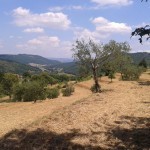
I arrive at Perugia airport. I’ve plucked up the courage to leave my husband and grumpy mono-syllabic teenagers behind. It’s the first time I’ve been on holiday alone for 20 years and I’m not even sure how to use the gears on the hire car.
Perugia, curled round a hill, has many steps. Waiters entice me to look at a tourist lunch menu. I can’t face eating in a restaurant alone so I stock up with locally produced food: Ciauscolo, Lake Trasimeno beans, apricots, pecorino and saltless bread, and find a picnic spot outside the Brufani Hotel. The water from the fountain is clear and cool, the mountains breath-taking.
I stumble on the Gallleria Nazionale dell’Umbria on the 3rd floor of a municipal building. The whole trip is already made worthwhile by the hour spent there looking at many pictures of the Madonna and child, the timeless themes of love, pain, motherhood. No little child pulls my sleeve saying ‘let’s go’. No bored teenager shuffles into the shop.
The winding roads take me to my Agritourismo: Casa de Carlicchi on the Tuscany\Umbrian border. The drive is beautiful but exhausting. No-one to say ‘Are we nearly there?’.I put on a brave face and walk in. I am greeted by a firm handshake from a warm brown eyed man called Cesare and a hug from his wife Christiana. On site is a music room full of instruments and a recording studio – perfect for teenage bands.
It’s not easy getting to sleep without hearing the sound of my husband’s or child’s breathing. That night, I wake at about 4am. No-one to disturb. I stumble out of bed, push the door and find myself with a head and sky full of stars. No-one to share the wonder.
The morning brings cool mountain air and bird song. Barely awake, stretching out of bed, I take a few steps over warm stone into the pool. No children to wake-up, no school uniform to iron. A few lazy laps then out to dry in the sun, the air warming up by the minute. No proud swimmer taking her feet off the bottom for the first time. I listen to cicadas and wind in the poplars. No sound of arguing, shouting splashing. The heat and silence are heavy. I amuse myself scooping colourful beetles out of the pool. No one to look at the little insect wings. Hungry I go to the fridge. No-one has eaten my apricots. No-one to share their deliciousness.
Walking up Mt Ginezzo above Cortona, I don’t pass a soul. No-one to share the magnificent views. I left my hire car far up an unmarked track. There’s no mobile reception. I could be bitten by a snake and eaten by worms before anyone would find me here.
That evening I brave going to the village pizzeria alone. It’s too early, I’m the only one there. The pizza is delicious. ‘Inglese’, a grandmother is told when she sees me. I catch the eye of a child who stares back. I miss my husband. I miss my babies, toddlers long ago grown into teenagers. I sleep for 12 hours. I haven’t slept so well for the last 15 years, not since I had children.
The next afternoon I drive to the hill top village of Monte Santa Maria Tibernia. So many twists and turns, I’m going to challenge the girls to Mario Kart on the Wii when I get home. Maps are deceptive, it takes ages to get there and I suspect some thunder is lurking. Will I get struck by lightning before I’ve had the chance to say goodbye to my family?
I am the only tourist in town. A 17 year old boy shows me round the castle with so much pride in the historic town he wants to help keep alive. He gets a big key to unlock the church for me and talks about the miraculous healing of the sick. I can’t imagine my children or indeed most English children talking so knowledgably, confidently and enthusiastically to an adult.
Driving back I get lost. The satnav doesn’t work. I don’t recognise the roads. No calm reassuring husband. Eventually I’m on the right track. I long for my little ‘home’. Fireflies make fairy lights in the forest. A deer jumps back into the darkness and gives me a thrill. No-one welcomes me but the cats. No children to tuck up in bed. No broken toys to walk over.
Back in London my daughter tells me knowledgably confidently and enthusiastically about what she has learned on a school trip. As I listen, my head is full of fireflies and stars and thoughts of the beautiful young woman she’s become.
About the author: Josephine is a writer, barrister and mother of two teenage girls. She lives in Hackney, London.
Thank you for reading and commenting. Please enter the Independence Travel Writing competition and tell your story.
The post Mom leaves the family behind to Perugia, Italy appeared first on We Said Go Travel.
September 6, 2014
Nothing will compare to the Philippines

Nothing will compare to the Philippines
Here.
In my life time, I have tried to find that one place where I could be free, where I could be nobody but myself; a place where I could truly call home. My eyes have seen and witnessed sceneries that once took my breath away but I knew that my search was not over yet. All those things were nothing but temporary, they now are nothing but just beautiful memories plastered in my mind. I was just about to give up until one day, my life completely changed.
I never thought my pursuit would end this way. I never imagined that life have planned something incredibly unexpected. I never predicted that it would find me, instead of me discovering that place.
It is a shame that I looked miles and miles away. If only I’d known that I would find what I was looking for here, just right around the corner. Ever since I’ve known you, my life has never been the same again. You managed to break my walls down and with all tenacity, unleashed my true colors.
Seeing my hand clasped into yours is the most beautiful scene I have ever seen. This, this love, is more than words could speak and what we have right now is just as amazing as the flickering lights of the Eiffel Tower. Whenever I am with you, I feel like I reached the highest peak of Mount Everest and when you lean in to kiss my cheek, your lips are just as warm as the deserts in the Middle East. This, this love, is like traveling all around the world, gaining new things and grasping each experience.
Here.
It is here in your arms where I sincerely feel like I belong. It is a lighthouse, a never-ending light that will always guide me home when I am lost in the shore. It is what I trust the most and what I will always look forward to at the end of each day.
If in case I will never get to see what the rest of the world has to offer, I am still grateful. Some people have the privilege to travel and get out there but never find the one thing I found: love. It is true that when you find someone worth keeping, nothing will ever replace and I will never trade this love, not even the grandest cities in the world.
About the author:
Alexx Esponga is a Filipina and a longtime writer. She covers local sports such as basketball, football and volleyball.
Thank you for reading and commenting. Please enter the Independence Travel Writing competition and tell your story.
The post Nothing will compare to the Philippines appeared first on We Said Go Travel.
North to Ayutthaya, Thailand
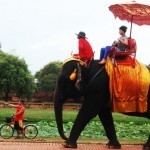
This is it.
To pursue that ever elusive work-life balance, travel buddy Mo and I turned in letters of resignation, primed old backpacks for active duty, and prepared to let years of work stress melt to nothingness in the greatest trip we’ve yet attempted.
All we needed was a place to go.
Scouring the web for all of eight minutes, we realized to great dismay that the Philippines would be racked by the habagat or southwest monsoon. “What if we could explore Ayutthaya in Thailand?” I mused. She had always loved ancient temples. “If we
tart from Singapore and keep on heading north via train, we can make it in a week.”
Her eyes gleamed, and it was so.
Singapore
Forming the southern tip of the Malay Peninsula, Singapore is the smallest but among the wealthiest countries in Asia. Legend has it that a 13th century prince named Sri Tri Buana, upon establishing his kingdom, saw a lion. To honour it, the island was named Singa Pura – the lion city.
After touching down at Changi Airport, we take the train to Little India. We plan our next moves carefully: to minimize costs we’ll visit attractions that charge no entrance fees!
Hours later we are bound for Bukit Timah, the highest point in the country. It is absolutely primeval, with dramatic merbau, seraya and keranchi trees forming a thick emerald canopy against the elements. Nestled amidst the branches are long-tailed macaques. Should you feed them though, you’ll be charged up to SG3000!
By nightfall, we head on to the Keppel Train Station and ride to Malaysia.
Kuala Lumpur
”Our Thailand train is fully booked: try again next week,” said the counter girl impassively. “We can … sleep on the floor,” I reasoned. She almost smiled before she caught herself. We’ll take a bus instead.
Capital and largest city of Malaysia, Kuala Lumpur or KL is home to 1.8 million people and iconic structures such as Petronas, the world’s tallest twin towers.
Morning saw us exploring the Batu Caves, one of the best Hindu shrines outside India. We pray to the Monkey God Hanuman, embodiment of strength. We also make an offering to another very important deity – the Money God.
Soon we head off to Puduraya bus station for the 1192 kilometer trip north.
Bangkok
“When yah get off, watch out for the scammers,” warns Kevin, an amiable Australian. “Especially the Tuk-tuk drivers. When yah wanna go somewhere, they tell yah it’s closed because of some holiday. Then they take yah to another place where yah’ll be forced to buy gems or clothes. So keep that guard up, eh?”
By lunch we pull into the capital of Thailand. Bangkok is a sprawling metropolis of 15 million people and countless attractions. We flag down a zooming Tuk-tuk and decide on a little experiment.
“How much to Wat Pho?” asks Mo.
“Oh no, no, no … Wat Pho closed now. Today is day of King, that’s why we all in yellow! Instead I take you to Temple of Happy Buddha. Then Thailand expo: cheap, cheap goods!”
“No thanks buddy, we’ll walk.”
Ten minutes later we arrive at Bangkok’s largest and oldest temple – completely open for business. Soon we gear up for our greatest destination – the ancient capital of Ayutthaya, 76 kilometres – you guessed it – north.
Ayutthaya
It was once a splendid city – one of the old world’s largest and home to a million folks in the 1700s. Dominated by glorious palaces, temples and ruled by 33 generations of Kings, Ayutthaya was the famed capital of Siam from 1350 until the Burmese sacked it in 1767. Now a UNESCO World Heritage Site, it is tended to with loving deference.
“Bring back bikes by six o’clock.” the old-timer yawned before leaving us with our new rides.
The heat and sudden monsoon downpour are completely forgotten as we flit in and out of a dreamland of temples: Wat Ratchaburana with its rows of seated stone Buddhas, Wat Phra Sri Sanphet with its domineering stupa mounds and Wat Phra Mahathat with its sacred Buddha head intertwined within a Banyan tree’s now-holy roots.
Before we know it we are surrounded by colossal elephants, a half-dozen of them all decked out in rouge regalia to tower over us mere mortals. The sheer beauty of the moment struck me and soon, everything turned into a haze. If the great Buddha achieved Nirvana under his Bodhi tree, then we achieved our goal in Ayutthaya – to once again enjoy life not as professionals, but simple beings playing our part in the fabric of life and time.
After flying 2398 kilometres and travelling by bus and train for another 1500 kilometres, we have at last come home. To the land of temples and elephants. And to freedom we have at last come home. To the land of temples and elephants. And to freedom.
Thank you for reading and commenting. Please enter the Independence Travel Writing competition and tell your story.
The post North to Ayutthaya, Thailand appeared first on We Said Go Travel.
September 5, 2014
The Lao Children of the Mekong River
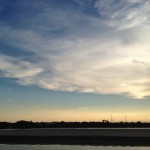
I’ve always believed that to be free, to find a place that will truly be free, you need to love yourself and embrace all your flaws. It must be a place that is accepting and where you can truly breath in the essence of God’s beauty.
When I reached an age where I could travel independently, I decided to finish visiting South East Asia. I was always one for community service, so my first stop was enchanting Laos.
Travelling alone is no easy feat, especially when you’re clutching your boarding pass, adrenaline pulsing through you, while you wait to board the plane.
But Laos was everything I dreamed of. The sunsets on Mekong River were fascinating and every morning, there would be people playing music before the low river that was the short walk between Laos and Thailand.
I was free, then, from all the constraints of daily life, all the examinations and due dates. The only due date was the due date of my canned food.
I volunteered at an orphanage. The head nun was about 80 years old and headed 4 orphanages for the disabled around Laos. She was amazing. Nobody there judged you for your past, but only for your present. They did not look your bag and brands, but instead at your heart and soul. They were so raw and pure tat I mourn the day they become pragmatic adults.
They slept on bed frames without mattresses and yet the way the ran across the fields to feed the cows show no backache that were reflective of us who sleep on muscle-memory mattresses. The way they swam in the muddy drains showed no disgust like us who swam in Olympic-sized pools that had a leaf or two.
They were free. They were free of worry and judgement. No, they did not care what people thought of them for the only judgement they cared for was that of God.
And while I watched them be free, be happy, I wanted to be free as well. I watched them kicking up dust whilst I helped the nun into the chapel in the evening and I wanted so badly to be free.
So that evening, when I walked down the same Mekong River, I took off my shoes and took a deep breath. I watched the incredible sun set and the excited dancers shake. I joined them and I laughed and I danced so terribly that I was certain I was free.
So now I beseech to you. To travel, to meet new people and discover places that the sun has not had the glory of the shining upon. Find children without worries that may teach you things beyond their years. Find elders who have lived through wars, who treasure freedom more than anyone else. Find great caves that have the freshest air, rooms that trap you but free your soul. Find open lands with greenery so green it makes the sky look green, land so big that you feel your heart grow.
I ask you, to travel and find yourself. Find somewhere or someone to show you what it is to be free and hopefully you will find yourself and be free.
Thank you for reading and commenting. Please enter the Independence Travel Writing competition and tell your story.
The post The Lao Children of the Mekong River appeared first on We Said Go Travel.
The Screaming Monkeys of Cambodia
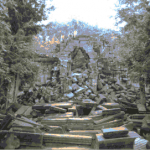
The Screaming Monkeys of Cambodia
The temple is a tiny thing, made of stone and wood, but as I stand in front of the doors shifting my backpack it seems as if the tiny building is much bigger than it does to the naked eye. My glasses have fogged up– the Cambodian heat and humidity, I think to myself. I wipe them on my shirt and they become even muddier. Somehow I am not annoyed in the slightest.
I hesitate. The doors are open, welcoming, yet I am afraid. I am a foreigner from a country with too many rules and not enough rain or children. Or monkeys. A piercing cry echoes from my right. I turn my head, the sweat dropping from the ends of my hair, to see a pair of monkeys perched on the stone wall of the temple. One is screaming at me. A threat? A broken welcome?
I walk into the temple; the threats of the monkey fall on deaf ears, as if I am drawn to this place by some unknown force. Something about the gate– vines entwined and crawling up a barren stone wall–makes me contort my face in a strange mixture of a frown and a grin. The sight is both sad and exotic, the last few remains of a slowly disappearing culture. I enter. Walking through the calm and dark passage among the hooting of the monkeys, I can see sculptures atop the gateway at the end of a narrow passage, a wooden beam perched on top of two cylindrical pillars. All these mythical figures, a flying horse here, a golden dragon there, shining angels etched into the pillars, mysterious and forgotten and austere.
There is something unusual about this temple. Not in the architecture or materials used to create this architect, but in the aura of the giant golden Buddha that faces me as I pass through the gate.
Contrary to the rugged cracking outer walls of the temple, the main hall is covered with gold and each wall is sculptured with various images, the etchings made by past masters of this temple. Children slumber peacefully on the floor of the temple, looking as content as if they were sleeping in the comfort of their own rooms, except here monkeys snuggle up to the sides of the children with their tails tucked around their small bodies for warmth. A father and his son harvest rice from the field as a woman looks over them, holding one end of a rope tied to the neck of a cow with sad stone eyes. It is with a warm rushing feeling of awe that I realize that these etchings on the wall show the daily life of villagers around the temple. There was a reason why the people of this tiny village did not tear down this dilapidated temple that has been sitting in the middle of the town. For those people, the temple is more than just a temple, but more like the living proof of their history. It is what keeps them from losing who they are while surrounded by a world that is continuously changing.
As I am wandering around the temple, the giant golden statue seems to be watching and smiling at me, following my footsteps with its all-seeing eyes. I notice, while walking along the stone walls, that a few monkeys are slowly following me. “Whoop whoop,” one screams, its eyes bright with intelligence. When I reach out my hand, the monkeys scamper away.
And suddenly I find myself at the feet of Buddha, golden and warmly smiling down at me as I suddenly feel self-conscious and insignificant and small, his half-closed eyes seeming as if they hold the key to the universe. I am freed, liberated, as I fall to my knees, the sweat and mosquitoes forgotten along with the gray city to which I have to return, the gray city and its people who trudge through their daily routines like gerbils spinning their wheels without even knowing where the road leads them. The Buddha is silent, inanimate, yet his is the most humane face I have seen in a long time.
I feel a tap on my shoulder; it is the head priest of this temple. His face is lined with wrinkles and I have a vague idea that each crease in his face contains more knowledge and emotion than I can ever fathom. I have stayed at the temple for more than several hours.
The time has come. I stand up and dust my pants. My backpack feels lighter on my shoulders. The sun is going down, yet my monkeys are still screaming.
About the Author: Ho Jun Jung allegedly has eighteen different pairs of white shirts that look almost the same. When he isn’t traveling to monkey-infested countries, he plays ping pong and eats nachos with cheese.
Thank you for reading and commenting. Please enter the Independence Travel Writing competition and tell your story.
The post The Screaming Monkeys of Cambodia appeared first on We Said Go Travel.
We Said Go Travel
We Said Go Travel is a global community of over sixteen hundred writers with articles from every continent.
Stories are shared with photos and video from a perspective of the transformative power of travel. We Said Go Travel has hosted live and online events as well as travel writing contests around the world. ...more
- Lisa Niver's profile
- 57 followers



